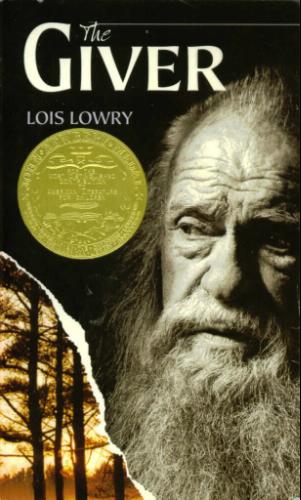I tend to only post when I'm really tired. I'm okay with that, though, because sleep is a waste of time. Anything I can do to put off sleeping is, therefore, not a waste of time. So here goes some procrastination:
Book: The Giver Lois Lowry 7.5/10
 So it took me a few more days than I expected to finish this little guy. It's only ~180 pages, which puts me at about 20 pages per day. I guess quantity isn't the goal here, though, it's quality. Right? Maybe.
So it took me a few more days than I expected to finish this little guy. It's only ~180 pages, which puts me at about 20 pages per day. I guess quantity isn't the goal here, though, it's quality. Right? Maybe.Now, unfortunately, when I finished this book, I immediately went onto wikipedia to read about it (see boots), and its summary and analysis was almost exactly verbatim what had been floating around in my head for the last week. See, I've found that the advantage to having this blog is that I think about the books I'm reading in more depth as I read. I think that this is partly the reason it took me a little longer to read this "young adult" book (I'll get back to that definition a little later), since I would constantly think about things I had just read. I also try to minimize those times when your eyes move over the words, but you don't process any of it. In order for me to understand the book, I need to have read it. Obviously. So as I was reading this book, I kept thinking about passages and themes that I could talk about on here, and I came up with a certain vocabulary, if you will, to be able to describe them. Since I read wikipedia's startlingly similar analysis to my own before I was able to get mine out of my head and onto (paper?), its vocabulary kind of took over my own. Since they were similar to begin with, it wasn't very hard for it to do. Now when I think of the book I think of words like "utopian" and "soft sci-fi" which are not the words I was going to use. Its weird to try to explain this, but I feel like wikipedia infiltrated my thoughts and manipulated them. I'm sure wikipedia's just buttering me up to become a part of some army it's forming. Stupid machines taking over the world.
To sum up: if you want to read my summary of the book, just check out the wikipedia page. It's probably more eloquent than me.
One thing that I did think about a lot while reading was why it's classified as a "young adult" book. I remember reading it sometime around late elementary to early middle school, and not quite soaking much of it up. Given, I've always been a pretty poor reader and it used to take a lot of willpower (that I never really had) to concentrate enough to understand books. So it may not really speak to much on the difficulty of the book (I didn't really understand Good Night Moon until I was in my late teens. Man, what a revelation that one was.).
But it got me to thinking where the cutoff is between adult and young adult fiction is. At first I thought that it had to be sentence structure and language. Surely young adult books have more precise language, less beating around the bush with unnecessary metaphors and shit like that, and simple-to-understand words. I love to read books that I need a dictionary for because it makes me feel like I'm being sophisticated or some shit like that, so I always keep one on my bedside table. Interestingly, I found myself reaching for it occasionally while reading this book. It certainly had its share of challenging passages in it. Sure it wasn't as metaphor-laden as, say, Calamity Physics was, but I've read many a grownup novel that doesn't use any kind of verbal trickery to get its story across.
Well then it's obviously the themes, right? Maybe. The themes in this book, like the inherent need for freedom and deep emotions, were pretty obvious - not in a bad way, it's just that they were never really disguised. Lowry made these pretty clear throughout the book, so there aren't really any surprises. Maybe this lack of depth contributes to it being young adult? Perhaps. But are these really childish themes? No. I feel like the real life relevance of the book (like recognizing that their societal control (eg eugenics, euthanasia) parallel real life events such as the Nazi movement) is anything but childish. Maybe I'm just reading too much into it, and maybe kids can understand that the society depicted was pretty fucked up.
(Ghosts just ended, so now [Lullabies to Paralyze Queens of the Stone Age])
As a last ditch effort to understand the age classification, I attempted to blame it on the main character's (Jonas') age (12-13). That's obviously a futile argument because not all youth-oriented books are about youth, and vice versa. I just started Running With Scissors today, and (at least so far) the main character is 9 (I think), and as far as I know, it isn't on middle schools' reading lists across the country.
I'll end by saying this: I don't care if The Giver got a slew of awards geared for young adult fiction, it's still a great read for those of us no longer in that category. I really enjoyed it.
No comments:
Post a Comment